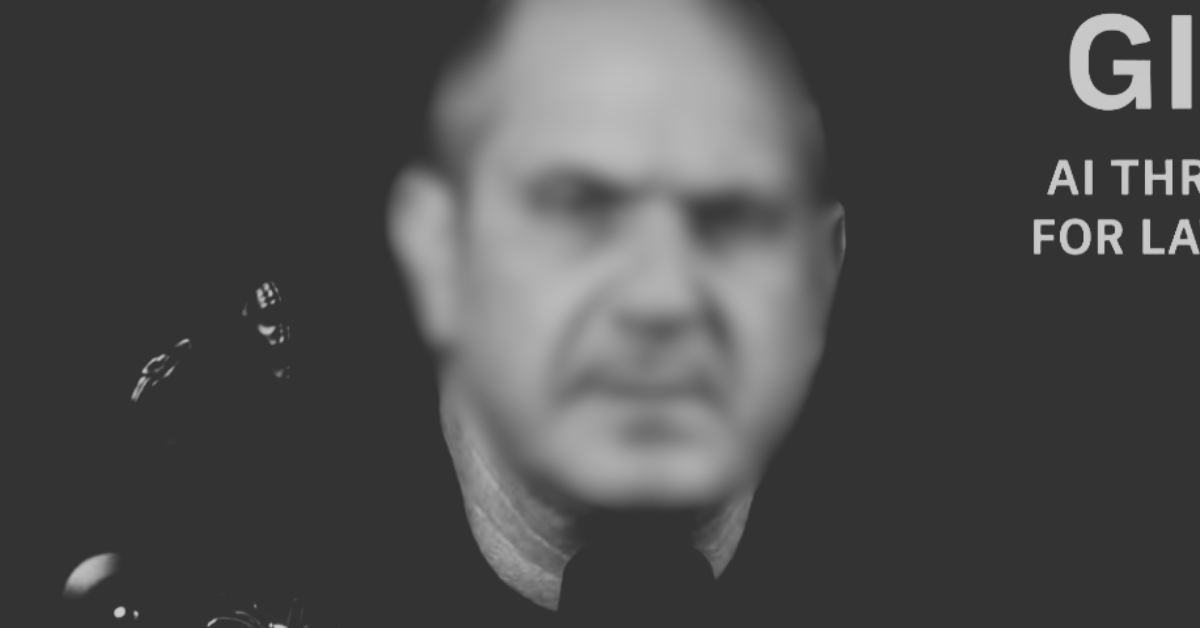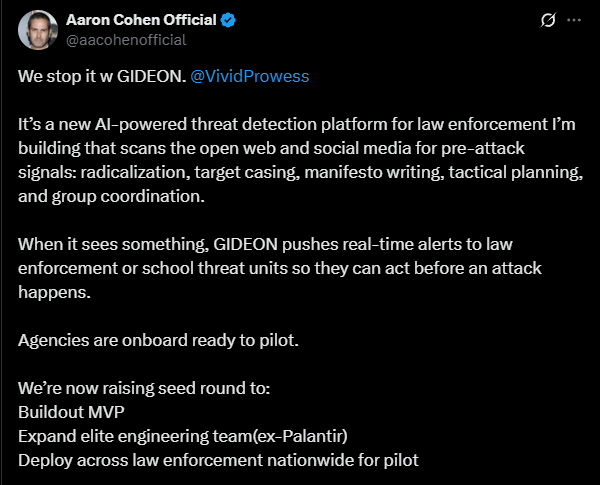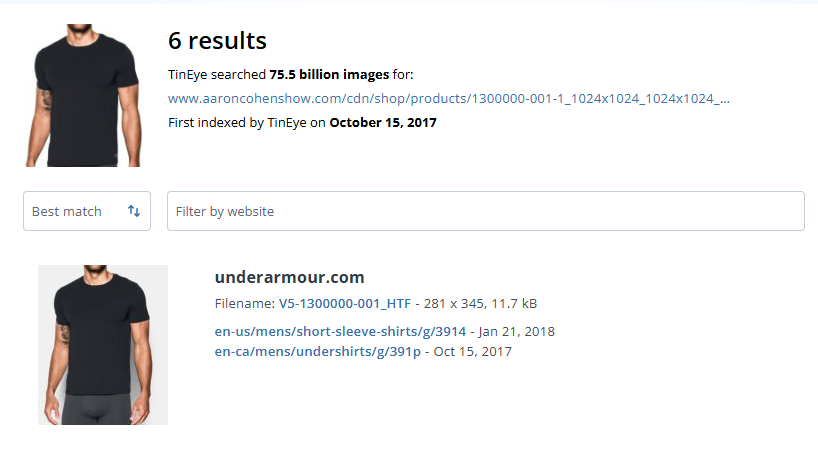
Threat Detection Theatrics: Aaron Cohen’s AI Surveillance “Tool” and Domestic Spy Machines
Categories: AI, Business, Cybersecurity, Data, Data Privacy, Digital Footprint, Government, Surveillance
Update – September 2025
Aaron Cohen had another Fox News appearance a few days ago, echoing the same claims – America’s first AI-first threat detection system (excluding the entire existing industry; SocialNet, Flock Safety, Clearview AI, Veritone, Dataminr First Alert etc.). This time, the messaging leveraged the recent Minneapolis School Shooting to try and sell the AI surveillance tool “GIDEON”. Apparently, it’s launching next week – expect another set of eyes on your digital footprint.
In a story that’s equal parts dystopian and deja vu, Aaron Cohen, a former IDF operative, and actor, turned Fox News commentator, recently pitched an “AI-powered threat detection system” designed to preemptively identify mass shooters and domestic threats.
The system, if implemented, would reportedly draw on publicly available data – social media, purchase histories, online behavior – and run it through a proprietary model trained to flag ‘pre-attack’ indicators.
This is the latest in the growing private sector surveillance grid aimed at American citizens, operating under the guise of public safety.
Cohen isn’t a fringe voice in this space. He’s been platformed by major news companies, praised for counter-terrorism credentials, and is now pushing this surveillance concept on national television.
But behind the buzzwords of “AI” and “safety” lies something much older and darker: the normalization of mass data collection without oversight.
SocialNet, a similar tool, has been described by Jeramie Scott, senior counsel at EPIC as part of an “unchecked surveillance ecosystem that lacks any meaningful transparency, oversight, or accountability.” – a description that maps well to Aaron Cohen’s proposed “Gideon”.
AI “Threat Detection” & Mass Surveillance Without Consent
The real issue isn’t just the tech – it’s the lack of guardrails. License-plate monitoring platform Flock, for example, has been responsible for incorrect arrests, misuse by a police lieutenant to stalk an estranged wife, and misidentifying vehicles as stolen.
Aaron Cohen’s claim that he’s building “The First AI-Powered Threat Detection System” seems to be drastically hyperbolic; with SocialNet boasting similar functionality, and Palantir – who have allegedly already secured hundreds of millions of dollars in government funding which may be used on similar surveillance tools, which will likely leverage AI.
Surveillance has evolved rapidly over recent years – with the current developments being a fusion of:
- Open-source intelligence (OSINT)
- Social media surveillance
- Behavioral prediction modeling
- Facial recognition (eventually)
- Network mapping
- Modern artificial intelligence
The pitch is always the same: “We can stop bad things before they happen.” But this logic has long been criticized by privacy advocates, legal scholars, and even former intelligence professionals. Predicting future crime based on digital footprints may open the door to more false positives, racial profiling, and political targeting.
There’s a real overreach problem when it comes to surveillance – but Aaron Cohen’s Gideon isn’t really part of it…why?
Aaron Cohen’s Gideon Doesn’t Actually Exist
Cohen’s platform isn’t a government operation – yet. It’s being positioned as a commercial service, available to law enforcement and “security-focused” agencies, but he’s gunning hard for government funding via media appearances.
To date, Gideon doesn’t appear to have secured any government funding. Not only that, but it doesn’t appear to even exist yet.
Aaron Cohen’s claim on Fox News – “I have just built, Shaun, the first AI-Powered Threat Detection System for law enforcement that scans the open web for radicalization and tactical planning and if someone in the Trump administration is listening, partner with me and lets scale this…”
The reality is, Aaron Cohen is trying to raise seed funds to build an MVP – that’s a minimum viable product. Even in its most basic form, Aaron Cohen’s “Gideon” isn’t ready for use – let alone scaling, government contracts, or national rollout.
Here’s a post from June 2, 2025:

So, why call upon the Federal Government when you haven’t got a product, or a team?
The answer might lie somewhere in Aaron Cohen’s official website – surely, there’s some more information about his groundbreaking product there? Not really – but you can donate money to his mission to build Gideon through his online store, by buying this “item” from his shop.
You can also buy concealment holsters, his books, his coffee brand, and of course, a drop-shipped “Tactical Utility” Black Crew Neck T-Shirt, which is strangely using some of the same product imagery as Underarmour.

Of all the surveillance tools that are currently being used – Gideon is probably not one you need to worry about.
But there’s still a real problem here; a growing industry of private surveillance companies selling detailed information about US citizens and non-citizens.
Your digital footprint is probably bigger than ever, and it’s being monitored and harvested by private companies ad nauseum, with minimal oversight or consent.
What You Can Do
- Audit Your Digital Footprint: Start with tools like Redact.dev to delete old content from platforms like Twitter/X, Facebook, Discord, Reddit, and more.
- Understand How OSINT Works: The line between what’s public and what’s protected is eroding.
- Support & follow EPIC – The Electronic Privacy Information Centre if you’re in the US, or your local equivalent digital privacy advocate.
And most importantly: don’t normalize this. We’ve seen this pattern before, and it doesn’t end well. The only way this kind of surveillance is allowed to exist is through cloak-and-dagger marketing; tapping into fear, patriotism, nationalism, AI buzzwords, and private-sector branding.
This isn’t about stopping threats. It’s about testing the public’s tolerance for being watched, profiled, and flagged – before you’ve done anything wrong.
We covered the foundation of these concepts in our SocialNet article – Aaron Cohen’s pitch is basically the same thing, but he said “AI”. And his tool doesn’t exist.